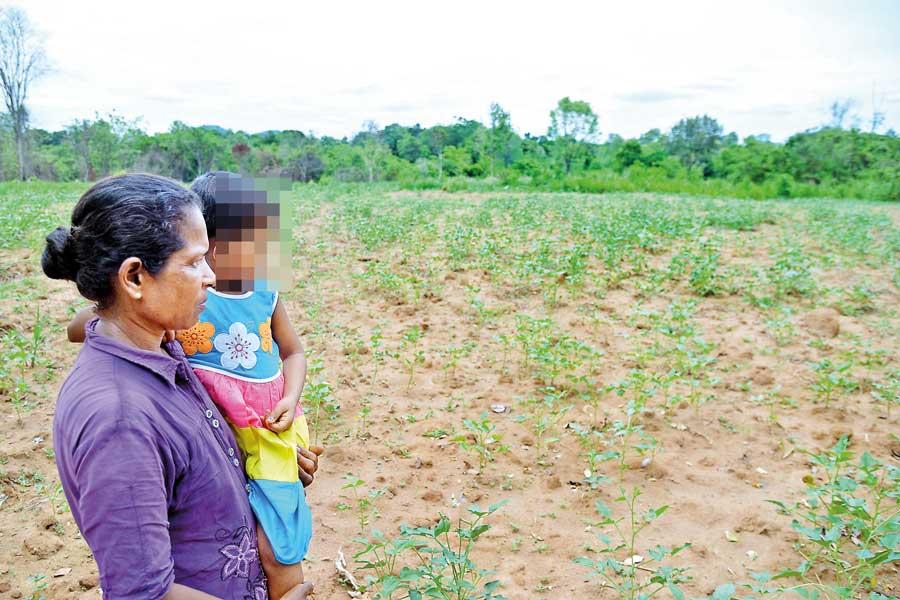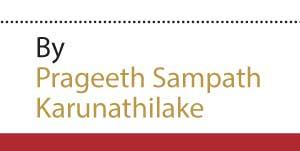20 Sep 2023 - {{hitsCtrl.values.hits}}

The future vision for villagers like Sudu Menika (seen in this picture) is limited because their eyes see nothing but the efforts put into cultivate these plots of land being defeated by the drought (Pix by Samantha Perera)
Although it is raining heavily in most parts of Sri Lanka these days, there are still many districts that have not received any rain. Ampara district is one and the locals are awaiting the arrival of rain; hoping it would improve their lives. Due to the severe drought about 300 families in 68/5 Marangala Grama Niladhari Division, Padiyathalawa, in Ampara district, are struggling to survive because they have no choice, but to live each day without thinking about tomorrow.
of rain; hoping it would improve their lives. Due to the severe drought about 300 families in 68/5 Marangala Grama Niladhari Division, Padiyathalawa, in Ampara district, are struggling to survive because they have no choice, but to live each day without thinking about tomorrow.
When this newspaper visited Keenathamulla village, which falls within the Marangala Grama Niladhari Division, it was evident that only a small group of people could afford three meals a day. This group mainly consists of individuals employed in government jobs or engaged in small businesses. However, even they find it challenging to assist others given the current economic difficulties the country is facing. Furthermore, Keenathamulla village has witnessed a significant number of kidney disease cases. In addition to dealing with the drought and a lack of basic necessities, the residents of this village are grappling with the ongoing economic crisis. Even adult children cannot provide a single meal for their parents and in some homes parents are unable to feed their own children. The level of helplessness experienced by many in this village is truly heartbreaking.
“This time, I borrowed money to cultivate mung. I haven’t managed to repay the 13,000 rupees for ploughing. My husband passed away six months ago due to kidney disease leaving me with three daughters. The eldest is married, the second recently sat for her O’Level Examination, and the youngest is only four years old. Our crops have been destroyed due to the drought” - K. D. Sudu Menika
All crops in Keenathamulla have succumbed to the drought and its villagers are worried about finding food. They planted maize, melons, mung, cowpea and other crops in their fields with unwavering hope. The fate of farming in this village, reliant solely on rainwater, is determined by the divine will.
 K. D. Sudu Menika, a resident of Keenathamulla village, cultivated mung (green Gram) in an acre of land with high hopes. “This time, I borrowed money to cultivate mung. I haven’t managed to repay the 13,000 rupees for ploughing. My husband passed away six months ago due to kidney disease leaving me with three daughters. The eldest is married, the second recently sat for her O’Level Examination, and the youngest is only four years old. Our crops have been destroyed due to the drought. There is no use of adding chemicals. I had a tumor in my stomach hence standing after the operation is now unthinkable. I find myself losing consciousness frequently; which makes it hard to find any work. The doctors have informed me that my blood levels are low and advised me to seek medication at the hospital. But my absence will leave my children alone and without a single meal. Therefore, I don’t want to get medical treatment,” she added.
K. D. Sudu Menika, a resident of Keenathamulla village, cultivated mung (green Gram) in an acre of land with high hopes. “This time, I borrowed money to cultivate mung. I haven’t managed to repay the 13,000 rupees for ploughing. My husband passed away six months ago due to kidney disease leaving me with three daughters. The eldest is married, the second recently sat for her O’Level Examination, and the youngest is only four years old. Our crops have been destroyed due to the drought. There is no use of adding chemicals. I had a tumor in my stomach hence standing after the operation is now unthinkable. I find myself losing consciousness frequently; which makes it hard to find any work. The doctors have informed me that my blood levels are low and advised me to seek medication at the hospital. But my absence will leave my children alone and without a single meal. Therefore, I don’t want to get medical treatment,” she added.
Sudu Menika’s family only eats rice once every two weeks. And even that small meal consists of rice borrowed from a neighbouring house. “We must return that borrowed rice and no shop in the village lends us goods as the villagers have no money and cannot repay debts. So, we are left with just one meal a day. We eat yams, manioc or jackfruit, but we cannot have them every day so as a result my children are hungry and crying. We only have one meal a day and skip the other two. It has become our way of life,” added Sudu Manika.
“We have no money to buy food. Desperate for funds to plant the crops I sold my two earrings for 6000 rupees, but it was of no use. I bought food items with that money. I bought a pair of earrings for 80 rupees from the local market for myself. I need to send my youngest daughter to preschool next year, but I have no money to buy a schoolbag, books, or even a dress. If the second child passes the O’ Level Exam there is no way I can provide for my child to attend tuition classes. As a solution to all this I started cultivating mung; only to see the cultivation being destroyed by the drought. Now we are helpless. We no longer receive Samurdhi and we are not entitled to receive Aswasuma. I live only for the sake of my children and not because I desire to live,” she added.
“If there had been rain I could have cultivated something. Everything has been destroyed due to the drought. I got 1900 rupees before through the elderly allowance, but I no longer receive it. I do not know the reason behind it,” -R. B. Siriyawathi
R. B. Siriyawathi, a 70-year-old resident of the same village, also does not receive Samurdhi, Aswasuma or the ‘Ping Padiya’. She is the mother of three, but even her children cannot provide for her adequately. These individuals are trapped in a state of helplessness. When asked whether she had breakfast and lunch, instead of words, her response came in the form of a smile. Upon further inquiries she said, “I did not have breakfast or lunch. There was no time to cook as I had work to do.” But the truth was she had nothing to cook that day. The previous day, Siriyawathi had jackfruit for lunch. On the day we visited her village, she could not even find jackfruit. “I will starve at night too. I am used to hunger now. If there had been rain I could have cultivated something. Everything has been destroyed due to the drought. I got 1900 rupees before through the elderly allowance, but I no longer receive it. I do not know the reason behind it,” she added.
B. M. Jane Nona, a 66-year-old woman, is a mother of seven children. Her children, too, lack the means to provide proper care for their parents. The harsh consequences of the country’s economic collapse, brought on by crop destruction caused by the drought, have impacted her life. “I have never received ‘Samurdhi’. They refuse to provide it and when requested and I do not know the reason. We could not cultivate anything this time because of the drought. If my husband manages to find work, he will do that. He is 67 years old. We are used to having just one meal a day,” she added.
PROPAGANDA DURING ELECTION
The 76-year-old A. M. Punchibanda resides in Keenathamulla, with his 74-year-old wife, P. M. Karunawathi, who is battling cancer and requires treatment in Ampara. This family, grappling with the inability to cultivate crops, is also affected by a severe economic hardship. They do not receive Samurdhi or Aswasuma benefits. They receive an elderly allowance amounting to 1900 rupees; which is enough for a single day. That is to visit Ampara Hospital from Padiyathalawa; a journey that costs 300 rupees per person. That totals up to 1200 rupees for a round trip, and additional expenses, such as a snack along the way costing up to 500-600 rupees, leaves them with no money for the next day’s treatment. Travelling in a tuk tuk would require 8000 rupees. “I’ve also undergone surgery and I cannot engage in farming. We have no other way to make a living. We cannot beg on the streets. Our children do their best to look after us, but they too face the setback as a result of the lost crops due to the drought. We no longer receive Samurdhi, and we are not entitled to receive Aswasuma. We manage to live, not by choice, but because we have no other option. Most of the time we manage with just one meal a day. Due to my wife’s illness, she can only have some porridge or crushed rice, while her medicines are powdered and given in the form of a paste,” he added.
Sugath Kumara, a young man aged 30 from Medawatta village in Padiyathalawa, makes a living by farming. He said, “We don’t really know what’s happening in the world or our country. We’re not that knowledgeable. I went to school only up to Grade 1. We are struggling to find food. I am a farmer, but I had to stop farming because of the drought. I cultivated Kohila in an area that retains water in the Maduru Oya Reserve. I manage to get about 15 bundles of Kohila from there, which I sell for 60-70 rupees each. I can’t do it every day, though. My mother and I rely on that money. Sometimes, I do hired work. When there’s no work, we go without food”. Kumara did not attend school, so he does not know much about the world. He has not been outside Mahiyanganaya. He has been a farmer ever since he was old enough to understand the small surroundings around him.
“I have never received ‘Samurdhi’. They refuse to provide it and when requested and I do not know the reason. We could not cultivate anything this time because of the drought. If my husband manages to find work, he will do that” - B. M. Jane Nona
B. M. Samantha, who is actively involved in various social service activities, said that no one would believe Kumara’s story and that there are people like him (Kumara) in such a developed ‘world’. “In Ampara, there are many people facing challenges similar to Kumara. They are in a constant struggle for survival. There are Sinhalese voters in Digamadulla division in Ampara. However, since the time of P.Dayaratne’s contributions to Ampara, other members of parliament have not done any work. Their visits to the villages were often limited to securing votes during elections, with little done for the welfare of the people. At present, in every village, the challenge is to ensure that there is something to eat for the next meal. If they had breakfast, their next problem is finding something for lunch. Even government officials have been unable to find solutions to these pressing issues. These problems could have been mitigated if relief efforts had been implemented earlier to address crop damage and drought-related challenges,” explained Samantha.
Aruna Indika, Grama Niladhari Officer of 68/5 Marangala Division, Padiyathalawa, said that the system that used to allocate marks for Aswasuma resulted in even those who had previously enjoyed Samurdhi losing their benefits. “We are no longer engaged in that work and this was done by the government. Additionally, there is no established mechanism to compensate individuals for crop damage,” he added.
These issues this newspaper highlighted are only about one hardship faced by a single village in the Ampara district. Across Sri Lanka, there are many individuals battling challenging circumstances like Sudu Menika, Siriyawathi, Jane Nona and Punchibanda. There are also government officials who dismiss the hardships faced by the residents of their respective local authorities; deeming them as unacceptable. Additionally, some politicians only appear during elections. In such a situation, hardships faced by individuals like those mentioned above in the Ampara district will persist.
“There are Sinhalese voters in Digamadulla division in Ampara. However, since the time of P.Dayaratne’s contributions to Ampara, other members of parliament have not done any work. Their visits to the villages were often limited to securing votes during elections” - B. M. Samantha
No compensation for crop damage
This writer also made inquiries from Keenathamulla Samurdhi Officer, Chandrasena Basnayake, regarding this matter. He said, “Currently, 2 families in the Keenathamulla village area are recipients of the ‘Samrudhi’ programme, while ‘Aswasuma’ assistance has been provided to 7 families. “In the past, many families benefited from the Samrudhi programme, but it was discontinued keeping with government decisions. We acknowledge that there still are eligible families in Keenathamulla village who should receive Samrudhi assistance, but this has been halted due to government directives. There is currently no established system to provide compensation for crop damage,” he added.
“Don’t believe what villagers have to say”- Gunasena
When this newspaper inquired with Padiyathalawa Divisional Secretary Sudarshan Gunasena, he made the following response: “Claims that Keenathamulla village does not receive Samurdhi benefits are not accurate. Don’t believe what villagers have to say. Within the Marangala GN division, there are about 300 families and many of them receive Samurdhi. There are is no plan yet to compensate individuals for crop damage. We received appeals for Aswasuma and they will be taken into consideration. Claims regarding the absence of Samurdhi are false. I do not acknowledge them. I do not have all the data. I cannot be sure about the financial status of all the villagers. There are 20 GN divisions. Do not focus only on one village,” said Gunasena.
24 Nov 2024 38 minute ago
23 Nov 2024 23 Nov 2024
23 Nov 2024 23 Nov 2024
23 Nov 2024 23 Nov 2024
23 Nov 2024 23 Nov 2024